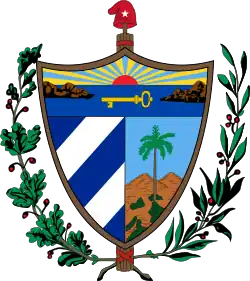Council of Ministers (Cuba)
The Council of Ministers (Spanish: Consejo de ministros), also referred to as simply the Cabinet of Cuba, is the highest ranking executive and administrative body of the Republic of Cuba, and constitutes the nation's government. It consists of the President, the First Vice President and the five Vice Presidents of the Council of State, the Secretary of the Executive Committee, the heads of the national ministries, and other members as established by law.
 |
|---|
|
|
The Executive Committee is a smaller body, consisting of the President and Vice Presidents of the Council of State, the Secretary and those ministers chosen by the President. The Council of Ministers is responsible for the implementation of policy agreements authorized by the National Assembly of People’s Power. These agreements are designated to individual ministries. The council also proposes general plans for economic and social development, which are in turn authorized by the National Assembly twice yearly.
The Council of Ministers also directs Cuba's foreign policy and its relations with other governments; approves international treaties before passing them over for ratification of the Council of State; directs and oversees foreign trade and the State budget. The Council of Ministers enforces laws authorized by the National Assembly, which are passed by the Council of State.
As a result of a referendum which was held on February 24, 2019, the Council of Ministers, and its power over the Cuban government, will be led by a Prime Minister.[1]
Current members
The body, was reformed in December 2019 with the appointment of Manuel Marrero Cruz as Prime Minister - the first with that title in 43 years - and six new ministers.[2] It currently consists of:[3][4]
| Position | Incumbent |
|---|---|
| President | Miguel Díaz-Canel |
| Prime Minister | Manuel Marrero Cruz |
| First Vice President of Council of Ministers (First Deputy Prime Minister) | Salvador Valdés Mesa |
| Vice Presidents of Council of Ministers (Deputy Prime Ministers) |
Ramiro Valdés Menéndez, Antonio Enrique Lussón Batlle, Adel Onofre Yzquierdo Rodríguez, Roberto Morales Ojeda, and Inés María Chapman |
| Vice Presidents of Council of Ministers and Executive Committee (Deputy Prime Ministers) |
Ricardo Cabrisas Ruíz and Ulises Rosales del Toro |
| Minister of Economy and Planning | Alejandro Gil Fernández |
| Minister of the Interior | Lázaro Alberto Álvarez Casas |
| Minister of Foreign Affairs (list) | Bruno Eduardo Rodríguez Parrilla |
| Minister of Justice | Oscar Manuel Silveira Martínez |
| Minister of the Revolutionary Armed Forces | Álvaro López Miera |
| Minister of Public Health | José Ángel Portal Miranda |
| Minister of Labor and Social Security | Marta Elena Feita Cabrera |
| Minister of Agriculture | Gustavo Rodriguez Rollero |
| Minister of Education | Ena Elsa Velázquez Cobiella |
| Minister of Energy and Mines | Liván Arronte Cruz |
| Minister of Culture | Alpidio Alonso Grau |
| Minister of Higher Education | Rodolfo Alarcon Ortiz |
| Ministerial President of the Central Bank of Cuba | Marta Wilson González |
| Minister of Science, Technology and Environment | Elba Rosa Pérez Montoya |
| Minister of Informatics and Communications | Jorge Luis Perdomo Di-Lella |
| Minister of Domestic Trade | Betsy Díaz Velázquez |
| Minister of Foreign Trade and Investment | Rodrigo Malmierca Diaz |
| Minister of Finance and Prices | Meisi Bolaños Weiss |
| Minister of Construction | Rene Mesa Villafana |
| Minister of Industry | Eloy Alvarez Martínez |
| Minister of Food Industry | Manuel Santiago Sobrino Martínez |
| Minister of Tourism | Juan Carlos García Granda |
| Minister of Transportation | Adel Onofre Yzquierdo Rodríguez |
| President of the Cuban Radio and Television Institute | Danylo Sirio López |
| President of the National Institute of Sports, P.E. and Rec | Julio Christian Jiménez Molina |
| President of the National Hydraulic Resources Institute | Antonio Rodríguez Rodríguez |
See also
References
- Mimi Whitefield (February 25, 2019). "Cuba approves new constitution: What changes, what doesn't?". Miami Herald. Retrieved February 25, 2019.
- Frank, Marc; Acosta, Nelson (2019-12-21). "Cuba names prime minister in move to lighten presidential load". Reuters. Archived from the original on 2019-12-21. Retrieved 2022-01-05.
- "Consejo de Ministros". Government of Cuba. Retrieved 2013-09-17.
- Consejo de Ministros de la República de Cuba | Presidencia y Gobierno de la República de Cuba
External links
- (Spanish) https://web.archive.org/web/20110209123658/http://www.cubagob.cu/ - tag "Miembros" (members)
- (Spanish) http://www.parlamentocubano.cu/index.php?option=com_content&view=article&id=49&Itemid=96